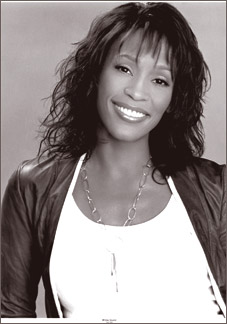The unexceptional end: The death of Whitney Houston
By Dr. Binoy KAMPMARK
Even if one is not a fan of such songs as 'Saving All My Love for You
and I ' Will Always Love You (mush, garnished by a touch of sweet
spice), there is no question that the person who sang them - Whitney
Houston - was someone the music industry took seriously. Such blue-stock
value is hard to ignore. A record of over 55 million records in the
United States alone is an irrefutable fact of influence.
 Her ending, however, was far less exceptional. The music industry
reaps with a certain ruthless determination, but tends to be rather
ordinary in its department of human welfare. Its representatives tend to
often capitalise on those who will heroically shine - at least for a
time - before the call to get off stage comes. Her ending, however, was far less exceptional. The music industry
reaps with a certain ruthless determination, but tends to be rather
ordinary in its department of human welfare. Its representatives tend to
often capitalise on those who will heroically shine - at least for a
time - before the call to get off stage comes.
Musical talents
This is hardly to point a finger at cause or suggest that Clive
Davis, the record producer credited with 'finding' her in a New York
nightclub in 1983, is the front of a mephistophelian collective.
But for all that, there is a more than palpable fact: musical talent,
notably of certain varieties, ever so often terminates in a narcotics
haze and hotel room in Beverly Hills.
Love songs
While the notion of a musical gene passed down with automatic ease
may be nonsense, Houston found herself in a rather rich collection of
it. Her mother, Cissy Houston, led the Sweet Inspirations, a grouping
that kept company with such acts as The Drifters. Her cousin was Dionne
Warwick. The voice that took her to such heights was, as Alexis Petridis
writing in the Guardian (Feb 12) describes, 'clean and cool, full of
melismatic embellishments.' But how she chose to apply that fashioned
instrument brought a fair share of criticism, deviating from assumed
gospel soul to the mainstream attractions of pop.
It was only with her third album, 'I'm Your Baby Tonight', that
Houston could be said to have provided an echo of soul music.
Her hits - commencing in the mid-1980s - also came at a time when the
angry black musical personality swearing with heated intensity came into
fashion. The music industry was being rocked by the sallies of hip-hop,
while Houston was serving safely sketched love songs and staying in
calmer waters.
It might be argued that it was only with her 1998 album 'My Love Is
Your Love' that she decided to cast safety aside, showing an edge
previously neglected.
From the summit, there is only one way. And that way is a dimly lit
one, littered with devastatingly deep potholes.
The devil, as she admitted, was well within her, actively doing good
works within her tormented mind.
That may also have been her then husband Bobby Brown, who seemed to
revel in his role as the destabilising dark eminence, involving Houston
in legal imbroglios and adventures into drug consumption. Her failure to
appear on time to Davis's induction into the Rock and Roll Hall of Fame
was a signalling shot that all was far from well.
Her touring started to show visible signs of decline, and her voice
began to lose its polish to the well entrenched drug habit. When she
decided to venture to the UK in 2010, the reviewers were ready with
their poisoned columns.
The press
The press, at least certain members, sank their fangs into the ailing
Houston after her Birmingham gig, where audible, and visible signs of
wear and tear were ample. 'They said Houston,' noted Caroline Sullivan
(Guardian, April 15, 2010), 'was off-key, out of breath and unfit to be
onstage, claiming that fans were booing and leaving in droves.' Amy
Winehouse would outdo her the following year in Belgrade, then expire.
For those who followed her music with affection, the atrophy, the
slide, was hard to stomach. She thrilled the tabloid narratives keen to
examine the state of health of her marriage to Brown.
She spawned clones - at least initially, Mariah Carey and Christina
Aguilera - who both seemed to be channelling Houston. But when she fell,
she did so at length, because Houston had, as Jon Caramanica opined in
the New York Times (Feb 12), 'so far to go, down from the clouds into
the abyss.'
Binoy Kampmark was a Commonwealth Scholar at Selwyn College,
Cambridge. He lectures at RMIT University, Melbourne. Email:
[email protected] |

